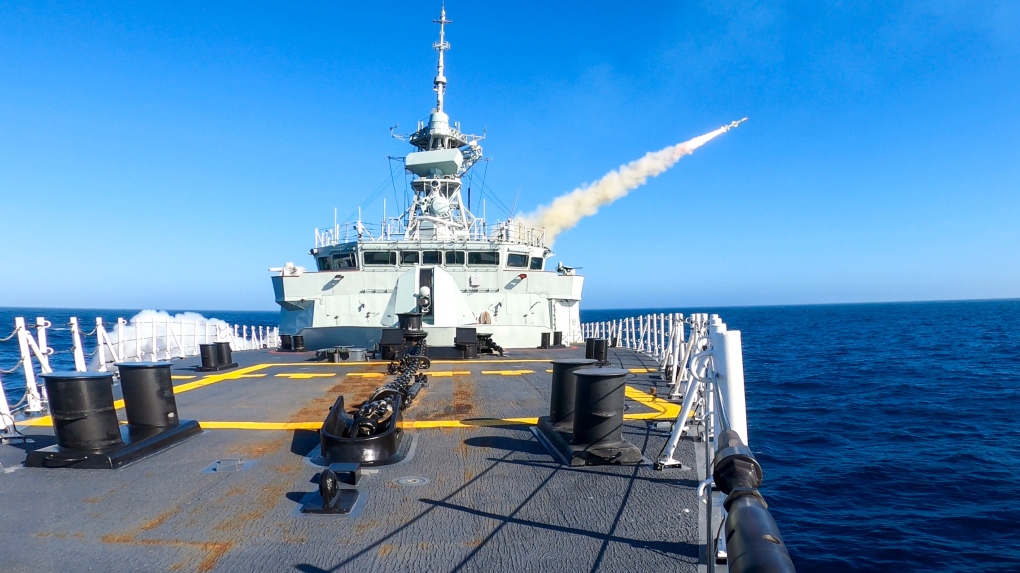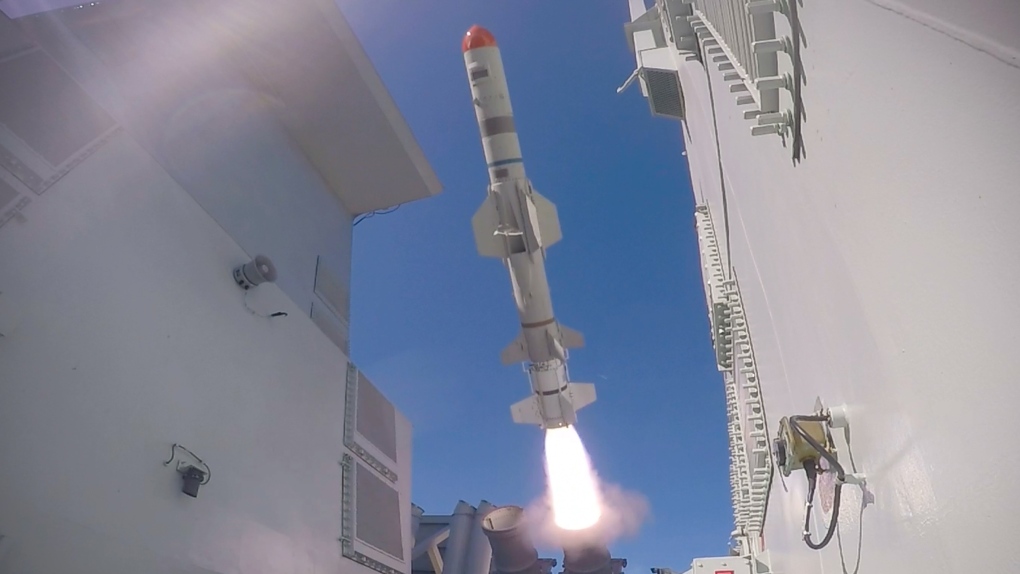Canadian warship missile test aborted mid-flight after communication failure
 A Harpoon Block II missile was fired from HMCS Regina during a joint Canada-U.S. exercise at the U.S. Navy's Point Mugu sea range off California on Oct. 23, 2024. (Royal Canadian Navy)
A Harpoon Block II missile was fired from HMCS Regina during a joint Canada-U.S. exercise at the U.S. Navy's Point Mugu sea range off California on Oct. 23, 2024. (Royal Canadian Navy)
A Canadian navy missile test was aborted mid-flight this week after controllers lost communication with the projectile off the coast of southern California.
The Harpoon Block II missile was lost at sea after it was fired from HMCS Regina during a joint Canada-U.S. exercise at the U.S. Navy's Point Mugu sea range near San Diego on Wednesday.
Cmdr. Jeremy Samson, the frigate's commanding officer, says the missile's flight was terminated approximately 30 to 60 seconds after it was launched toward a surface target situated about 55 kilometres from the ship.
"Without getting into too many of the technical details, there was an issue with the first missile," Samson said in a telephone interview from the warship Thursday.
"When you fire a missile on a range, there are safety procedures to make sure the missile is doing what it's supposed to, and losing that communication can cause you to order the missile to destruct," he added.
A Department of National Defence spokesperson says the precision-guided missile plunged in the ocean within the 93,000-square-kilometre sea range and was not recoverable.
"As safety is paramount during any military live fire exercise, constant communication between the missile and the range facility is required," the National Defence spokesperson said in an emailed statement.
"These pathways are checked and verified before the missile is launched. However, after launch, if communication is lost – even temporarily, and for any reason – the range will terminate the missile in flight."
HMCS Regina followed up the failed shot with a second attempt, which "reached its target and fulfilled stated mission requirements," the National Defence spokesperson said.
 A Harpoon Block II missile fired from HMCS Regina during a joint Canada-U.S. exercise off California on Oct. 23, 2024 (Royal Canadian Navy)
A Harpoon Block II missile fired from HMCS Regina during a joint Canada-U.S. exercise off California on Oct. 23, 2024 (Royal Canadian Navy)
The Harpoon Block II missile, estimated to cost upwards of $2 million each, is not a new weapon for the Royal Canadian Navy.
Another Pacific fleet frigate, HMCS Vancouver, fired the first Canadian test of the surface-to-surface missile during the same California-based exercise in 2016.
The introduction of the Harpoon Block II missile, an updated version of the anti-ship missile carried by Canadian frigates for decades, afforded the warships the capability to attack targets on land as well as at sea.
"Though we have done those in the past, the targeting process was meant to be a bit more dynamic," Commodore Dave Mazur, the commander of the Canadian Fleet Pacific, wrote in a post on X, referring to this week's exercise.
"The shot was similar to what might be seen in the Black Sea, requiring manoeuvre around land to hit something moving close to land."
The test-fired missiles were carrying sensor packages in place of warheads to allow controllers to collect data on the missile's automated processes during flight.
"When the range loses that data, that is a critical step for them – for safety reasons – to order that missile be destroyed in flight," Samson, the ship's commander, said.
Despite the failure of the first missile, the National Defence spokesperson characterized the exercise as a successful demonstration of "high-level military targeting processes," including the capability to orchestrate and direct long-range naval weaponry against targets on or near land.
The 12 Halifax-class frigates in the Canadian fleet can each carry up to eight Harpoon missiles.
CTVNews.ca Top Stories

Labour minister unveils steps to end Canada Post strike
Canada Post workers began their strike four weeks ago, halting mail and package deliveries across the country. Labour Minister Steven MacKinnon said he hopes work will resume as early as next week.
'Little girl deserves justice': Gallery erupts in anger as charges stayed against driver who killed child
In a tense courtroom, a judge stayed the charge against a Saskatoon woman who hit and killed a nine-year-old girl.
Skier who went missing at Sun Peaks Resort found dead
In a tragic turn of events, the 68-year-old man who went missing while skiing at Sun Peaks Resort earlier this week has been found dead, the RCMP confirmed Friday.
Canada's homicide rate down in most provinces, with 2 exceptions
The homicide rate is declining in Canada, and the country's three largest cities all saw double-digit percentage decreases in homicides per capita, according to data released this week.
Dreaming of a white Christmas? Here are the Canadian cities where snow has been a sure thing
With fewer than two weeks remaining until Christmas Day, weather forecasts and snowfall projections are starting to take shape but have yet to be finalized for cities across Canada.
'They believe in diplomacy, good luck': Doug Ford doubles down on energy threat as some premiers distance themselves
Doug Ford is standing behind his threat to stop providing the U.S. with electricity in response to president-elect Donald Trump's promised tariffs, even as several other premiers publicly distance themselves from the stance.
'He was done with shopping': Video shows dog laying on horn in B.C. mall parking lot
Malls can be hectic around the holidays, and sometimes you just can't wait to get home – whether you're on two legs or four.
Trump wants to turn the clock on daylight saving time
U.S. president-elect Donald Trump wants to turn the lights out on daylight saving time.
Mysterious googly eyes go viral after appearing on public art in Oregon
Googly eyes have been appearing on sculptures around the central Oregon city of Bend, delighting many residents and sparking a viral sensation covered widely by news outlets and featured on a popular late-night talk show.
































